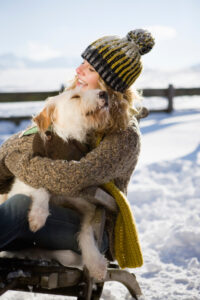
It is essential to ensure pet safety in your home during the holidays.
The holiday season is a magical time filled with joy, celebrations, and family gatherings. However, the hustle and bustle of the holidays can introduce a range of hazards for our beloved pets. Ensuring your pet’s safety during the holidays requires a bit of planning and awareness. Here are essential tips to keep your furry friends safe and happy throughout the season.
Holiday Decorations and Pet Safety
Decorations make your home festive but can be dangerous for pets. Be mindful of the following:
- Christmas Trees:
- Secure your tree to prevent it from tipping over if your cat decides to climb it or your dog bumps into it.
- Avoid using tinsel, as it can be irresistible to pets but dangerous if ingested, leading to intestinal blockages.
- Keep ornaments, especially breakable ones, out of reach. Broken ornaments can cause injuries.
- Lighting and Wires:
- Exposed wires from string lights or electric decorations can lead to electrical burns or shocks if chewed. Use cord protectors or keep wires out of reach.
- Turn off lights and unplug decorations when not in use.
- Candles:
- Place candles in areas where pets can’t reach them. Curious pets might knock them over, leading to burns or fires.
- Use flameless candles to achieve the ambiance you’re looking for without the added risks of an open flame.
Holiday Foods to Avoid
The holidays are filled with delicious treats, but many of these are harmful to pets:
- Chocolate: Contains theobromine, which is toxic to dogs and cats.
- Alcohol: Even small amounts can cause serious health problems in pets.
- Bones: Cooked bones from turkey, chicken, or ham can splinter and cause choking or digestive issues.
- Fatty Foods: High-fat foods can lead to pancreatitis in pets.
- Onions, Garlic, and Raisins: Common ingredients in holiday dishes, these are toxic to dogs and cats.
- Sweeteners: Xylitol, found in sugar-free candies and baked goods, is extremely toxic to dogs.
To prevent accidents, keep food out of reach and educate guests about the dangers of feeding pets table scraps. If you would like to share some food with your companion, make them a separate serving that is left plain without spices. Plain turkey, ham, and mashed potatoes can be a delightful treat in small amounts.
Safe Spaces and Holiday Stress
Holidays often mean increased visitors, loud noises, and changes in routine, which can stress pets.
- Create a Safe Space:
- Designate a quiet, cozy area where your pet can retreat if they feel overwhelmed.
- Include their favorite toys, bedding, and water to help them feel secure.
- Supervise Interactions:
- Monitor interactions between pets and guests, especially young children, to prevent unintentional harm.
- Stick to Routines:
- Try to maintain regular feeding and walking schedules to provide consistency.
Traveling With Pets
If your holiday plans include traveling, ensure your pet’s safety:
- Secure Travel:
- Use a pet carrier, crate, or safety harness to secure pets in vehicles.
- Pack Essentials:
- Bring their food, water, medications, and comfort items.
- Microchip and ID:
- Ensure your pet’s microchip information and ID tags are up-to-date in case they get lost.
Winter Weather Precautions
For those celebrating in colder climates, don’t forget about weather-related risks:
- Limit Outdoor Time:
- Prolonged exposure to cold can lead to hypothermia. Keep outdoor activities brief.
- Protect Paws:
- Snow, ice, and salt can irritate paw pads. Wipe their paws after being outside and consider pet-safe booties.
- If you need to salt your driveway or walkways, use pet-safe salt options.
- Provide Warm Shelter:
- Ensure your pet has a warm place to rest indoors.
Holiday Plants and Toxicity
Many holiday plants are beautiful but potentially dangerous:
- Poinsettias: Can cause vomiting or drooling if ingested.
- Holly and Mistletoe: Both can be toxic, leading to gastrointestinal upset or more severe symptoms.
- Lilies: Extremely toxic to cats and should be avoided entirely.
Consider using artificial alternatives, and keep all plants—real or fake—out of reach of pets.
Final Thoughts
By taking proactive steps to address common hazards, you can enjoy the holidays without compromising your pet’s safety. Always prioritize supervision and prepare for emergencies by having your veterinarian’s contact information readily available.
Trust Maryland Veterinary Surgical Services With Your Companion’s Health
Your companion’s health is important, and the team at MVSS is ready to provide the best care possible for your furry family. We are dedicated to combining comprehensive exams and assessments with informative and honest discussions of your companion’s care. Once we have worked with you to decide on the best course of action for your dog, our professionals will use their surgical expertise to work towards the goal of giving your companion an active and pain-free life. We are proud to serve loyal companions in Catonsville and Baltimore. To learn more about our services, give us a call at 410-788-4088 or visit us online. For more information and tips for dog health, follow us on Facebook and Pinterest.
